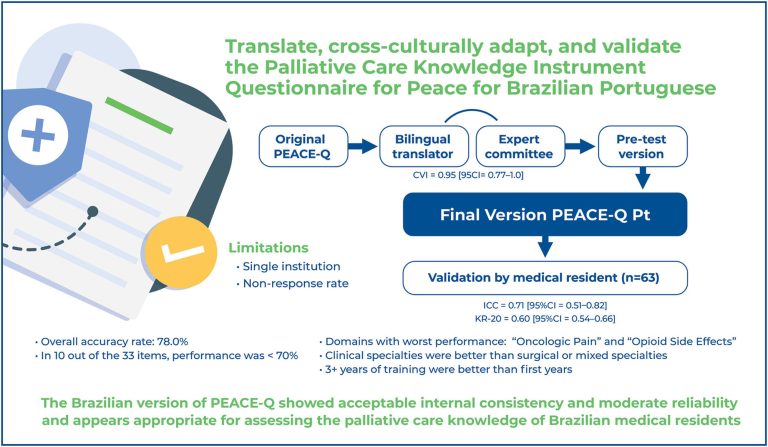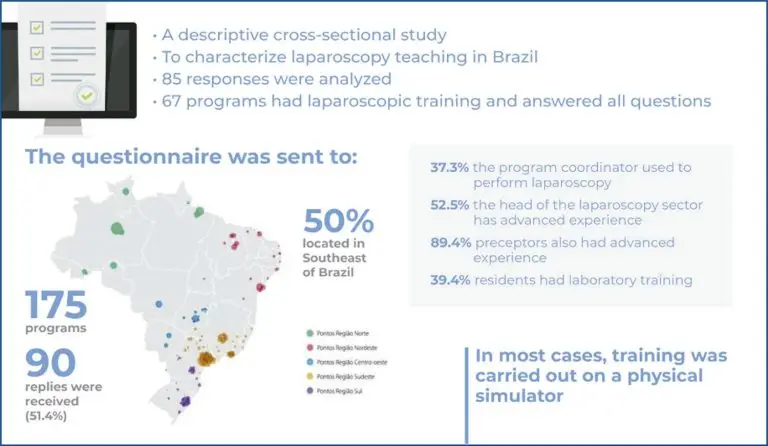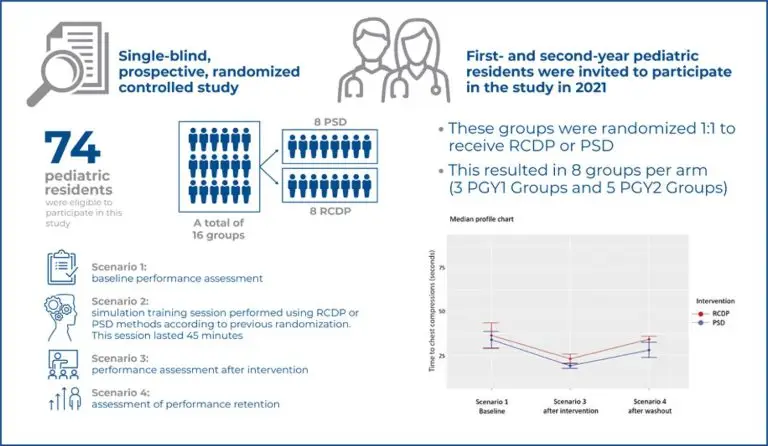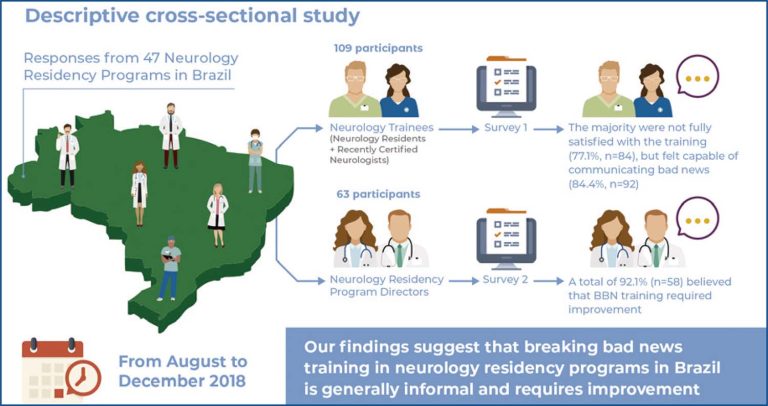30/Jul/2025
Translation, cross-cultural adaptation, and validation of the Palliative Care Knowledge Questionnaire for PEACE (PEACE-Q) in Brazilian Portuguese
einstein (São Paulo). 30/Jul/2025;23:eAO1243.
View Article30/Jul/2025
Translation, cross-cultural adaptation, and validation of the Palliative Care Knowledge Questionnaire for PEACE (PEACE-Q) in Brazilian Portuguese
DOI: 10.31744/einstein_journal/2025AO1243
Highlights ■ Performance was <70% in 10 of the 33 items. ■ Lowest performance domains were Oncologic Pain and Opioid Side Effects. ■ Residents in clinical specialties outperformed those in surgical or mixed specialties. ■ Residents with ≥3 years of training outperformed those on their first 2 years. ABSTRACT Objective: To translate, cross-culturally adapt, and validate the Palliative Care Knowledge Questionnaire for PEACE (PEACE-Q) in Brazilian Portuguese. Methods: This study followed five steps: translation, back-translation, cultural adaptation, pre-test, and test-retest. […]
Keywords: Clinical competence; Education, medical; Internship and residency; Palliative care; Psychometrics; Surveys and questionnaires; Validation study as topic
20/Aug/2024
Current status of laparoscopy teaching in gynecology and obstetrics medical residency in Brazil
DOI: 10.31744/einstein_journal/2024AO0458
Highlights Only 20% of the medical residency programs have laparoscopic teaching. Preceptors of the residency programs have advanced experience. Most programs have no plan to set up a training center. Resideny programs are concentrated in the Southeast region and in capitals. ABSTRACT Objective: To characterize laparoscopy teaching in Medical Residency Programs in Gynecology and Obstetrics in Brazil, and to evaluate preceptors’ characteristics in laparoscopy programs and map laparoscopic training practice scenarios. Methods: This descriptive cross-sectional study evaluated questionnaire responses from […]
Keywords: Brazil; Education, medical; Health Knowledge, Attitudes, Practice; Internship and residency; Laparoscopy; Minimally invasive surgical procedures; Surveys and questionnaires
18/Jul/2024
Rapid cycle deliberate practice versus postsimulation debriefing in pediatric cardiopulmonary resuscitation training:a randomized controlled study
einstein (São Paulo). 18/Jul/2024;22:eAO0825.
View Article18/Jul/2024
Rapid cycle deliberate practice versus postsimulation debriefing in pediatric cardiopulmonary resuscitation training:a randomized controlled study
DOI: 10.31744/einstein_journal/2024AO0825
Highlights Improvement in the performance of simulated pediatric cardiopulmonary resuscitation was observed after postsimulation debriefing and rapid cycle deliberate practice sessions. Postsimulation debriefing and rapid cycle deliberate practice are suitable for cardiopulmonary resuscitation training among pediatric residents. Retention of knowledge and skills deteriorated 5 weeks after training. ABSTRACT Objective: Simulation plays an important role in cardiopulmonary resuscitation training. Comparing postsimulation debriefing with rapid cycle deliberate practice could help determine the best simulation strategy for pediatric cardiopulmonary resuscitation training among pediatric […]
Keywords: Cardiopulmonary resuscitation; Internship and residency; Patient simulation; Pediatric emergency medicine; Simulation training
30/Mar/2023
Breaking bad news in neurology: assessing training, perceptions, and preparedness among residency programs in Brazil
DOI: 10.31744/einstein_journal/2023AO0036
Highlights • Neurology trainees and program directors recognized a lack of structured breaking bad news training. • Program directors reported that many factors hinder the implementation of breaking bad news education. • Trainees felt capable of breaking bad news, but most did not have lectures, simulations, nor feedback. • Trainees acknowledged negative feelings when breaking bad news, including sadness and helplessness. ABSTRACT Objective We aimed to evaluate how breaking bad news training was implemented in neurology residency programs in Brazil […]
Keywords: Communication; Education; Internship and residency; Learning; Mentoring; Neurology; Surveys and questionnaires
01/Jan/2017
Patient safety: knowledge between multiprofessional residents
DOI: 10.1590/S1679-45082017AO3871
ABSTRACT Objective To assess the knowledge of multiprofesional residents in health about the security of the patient theme. Methods Cross-sectional study, quantitative, developed with graduate courses/residence specialties of health in a public university of Paraná, Brazil. Participants (n=78) answered a questionnaire containing nine objective questions related to patient safety. Data were analyzed using descriptive statistics, in proportion measures. The minimum 75% of correct answers was considered the cutoff for positive evaluation. Results The sample was predominantly composed of young people […]
Keywords: Internship and residency; Knowledge management; Patient safety
01/Oct/2016
Assessment of laparoscopic skills of Gynecology and Obstetrics residents after a training program
einstein (São Paulo). 01/Oct/2016;14(4):468-72.
View Article01/Oct/2016
Assessment of laparoscopic skills of Gynecology and Obstetrics residents after a training program
DOI: 10.1590/S1679-45082016AO3752
ABSTRACT Objective To evaluate laparoscopic skills of third-year Gynecology and Obstetrics residents after training at a training and surgical experimentation center. Methods Use of a prospective questionnaire analyzing demographic data, medical residency, skills, competences, and training in a box trainer and in pigs. Results After the training, there was significant improvement in laparoscopic skills according to the residents (before 1.3/after 2.7; p=0.000) and preceptors (before 2.1/after 4.8; p=0.000). There was also significant improvement in the feeling of competence in surgeries […]
Keywords: Education, medical; Gynecology; Internship and residency; Laparoscopy; Obstetrics and Gynecology department, hospital/manpower; Surveys and questionnaires; Training






